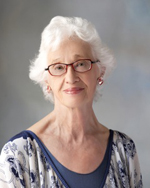Naomi Feil Biography
Naomi Feil, M.S.W., A.C.S.W., is the developer of Validation. She was born in Munich in 1932, and grew up in the Montefiore Home for the Aged in Cleveland Ohio, where her father was the administrator and her mother, the head of the Social Service Department. After graduating with a Masters degree in Social Work from Columbia University in New York, she began working with the elderly. Between 1963 and 1980 Mrs. Feil developed Validation as a response to her dissatisfaction with traditional methods of working with the severely disoriented old-old people who were her clients. In 1982 she published her first book, Validation: The Feil Method, which was revised in 1992. Her second book, The Validation Breakthrough, was published in 1993, and updated and revised in 2002. Feil and her husband have made many films and videos about aging and Validation. Feil is the Executive Director of the Validation Training Institute and a popular speaker in North America and Europe. Since 1989 she has toured Europe 3 times a year offering workshops in Validation to participants in Germany, the Netherlands, Scandinavia, France, Belgium, Italy, Great Britain, and Austria. Her books have been translated into French, Dutch, German, Italian, Finnish, Danish, Swedish, Spanish and Japanese.
Principles of Validation Therapy*
1. All people are unique and must be treated as individuals.
2. All people are valuable, no matter how disoriented they are.
3. There is a reason behind the behavior of disoriented old-old people.
4. Behavior in old-old age is not merely a function of anatomic changes in the brain, but reflects a combination of physical, social and psychological changes that take place over the lifespan.
5. Old-old people cannot be forced to change their behaviors. Behaviors can be changed only if the person wants to change them.
6. Old-old people must be accepted nonjudgmentally.
7. Particular life tasks are associated with each stage of life. Failure to complete a task at the appropriate stage of life may lead to psychological problems.
8. When more recent memory fails, older adults try to restore balance, in their lives by retrieving earlier memories. When eyesight fails, they use the mind’s eye to see. When hearing goes, they listen to sounds from the past.
9. Painful feelings that are expressed, acknowledged, and Validated by a trusted listener will diminish. Painful feelings that are ignored or suppressed will gain strength.
10. Empathy builds trust, reduces anxiety, and restores dignity.
*Validation Therapy, Naomi Feil, “The Validation Breakthrough: Simple techniques for Communicating with People with Alzheimer’s-Type Dementia," 1993
Learn more about Validation Therapy
Naomi Feil, M.S.W., A.C.S.W., is the developer of Validation. She was born in Munich in 1932, and grew up in the Montefiore Home for the Aged in Cleveland Ohio, where her father was the administrator and her mother, the head of the Social Service Department. After graduating with a Masters degree in Social Work from Columbia University in New York, she began working with the elderly. Between 1963 and 1980 Mrs. Feil developed Validation as a response to her dissatisfaction with traditional methods of working with the severely disoriented old-old people who were her clients. In 1982 she published her first book, Validation: The Feil Method, which was revised in 1992. Her second book, The Validation Breakthrough, was published in 1993, and updated and revised in 2002. Feil and her husband have made many films and videos about aging and Validation. Feil is the Executive Director of the Validation Training Institute and a popular speaker in North America and Europe. Since 1989 she has toured Europe 3 times a year offering workshops in Validation to participants in Germany, the Netherlands, Scandinavia, France, Belgium, Italy, Great Britain, and Austria. Her books have been translated into French, Dutch, German, Italian, Finnish, Danish, Swedish, Spanish and Japanese.
Principles of Validation Therapy*
1. All people are unique and must be treated as individuals.
2. All people are valuable, no matter how disoriented they are.
3. There is a reason behind the behavior of disoriented old-old people.
4. Behavior in old-old age is not merely a function of anatomic changes in the brain, but reflects a combination of physical, social and psychological changes that take place over the lifespan.
5. Old-old people cannot be forced to change their behaviors. Behaviors can be changed only if the person wants to change them.
6. Old-old people must be accepted nonjudgmentally.
7. Particular life tasks are associated with each stage of life. Failure to complete a task at the appropriate stage of life may lead to psychological problems.
8. When more recent memory fails, older adults try to restore balance, in their lives by retrieving earlier memories. When eyesight fails, they use the mind’s eye to see. When hearing goes, they listen to sounds from the past.
9. Painful feelings that are expressed, acknowledged, and Validated by a trusted listener will diminish. Painful feelings that are ignored or suppressed will gain strength.
10. Empathy builds trust, reduces anxiety, and restores dignity.
*Validation Therapy, Naomi Feil, “The Validation Breakthrough: Simple techniques for Communicating with People with Alzheimer’s-Type Dementia," 1993
Learn more about Validation Therapy

